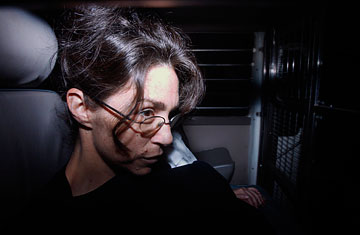
Nancy Kissel, dubbed the milk-shake murderess, sits in a prison van as she arrives at the Court of Final Appeal in Hong Kong on Feb. 11, 2010
One night in Hong Kong in November 2003, American expat Nancy Kissel smashed her husband's skull with a heavy lead ornament. Four days later, police discovered his rotting corpse, wrapped in a carpet in the basement storeroom of the luxury apartment complex where the couple lived. An autopsy found a cocktail of sedatives in his stomach and liver. The 39-year-old mother of three was accused of giving her husband a sedative-laced milk shake before clubbing him to death, and in 2005, Kissel was convicted of premeditated murder and sentenced to life. In her first appeal, which she lost, the court called it "as cogent a case of murder as might be imagined."
Hong Kong's notorious "milk-shake murder" case may have seemed cogent, but last week Hong Kong's top court disagreed. The court granted Kissel her second and final appeal, ordering a retrial and creating the possibility that Hong Kong's murder trial of the decade will be replayed in court. "Mrs. Kissel killed Mr. Kissel. That much is not in dispute," the Court of Final Appeal wrote in a unanimous decision. "But was the killing certainly murder or might it have been in self-defense?"
The first time around, the real-life courtroom drama captivated Hong Kong's expat community and made headlines as far away as New York, spawning a made-for-TV movie and a true-crime best seller. During the 2005 trial, the prosecution chipped away at Kissel's credibility by revealing she had a secret lover in Vermont — a television repairman. The team put a private investigator on the stand who said that her husband, an investment banker, told him he was worried his wife was trying to poison him — testimony that the appeals court judge dismissed last week as hearsay that should have been deemed inadmissable in court.
Kissel's lawyers, however, painted a different picture; one of a sexually abusive husband who trawled the web for escorts and gay porn. Kissel admitted that she killed her husband, but said that he had come at her with a baseball bat and that she had been defending herself. Her doctor testified that Kissel didn't show any signs of being physically attacked with a bat, but later said it was possible she was assaulted. Kissel side stepped the question of whether or not she had served her husband a drug-laced milk shake. As the local English daily the South China Morning Post noted at the time, few were surprised when the verdict came in guilty.
If tried again, Kissel's lawyers hope to argue that she was mentally impaired at the time of the killing. She might walk away with time served. A new trial, however, may reveal less about the milk-shake murder than it does about the health of Hong Kong's judicial system. The Court of Final Appeal quashed Kissel's earlier conviction on the grounds that the prosecution relied on hearsay from the private investigator, and that the trial judge misdirected the jury on the question of self-defense.
How could a lower appeals court call the case "as cogent ... as might be imagined" if the top court found such glaring problems? It's a glaring question for Hong Kong's judicial system to answer. In Hong Kong, roughly 75% of not-guilty pleas end in a conviction; in England and Wales, that figure is less than 8%. One prominent lawyer, Clive Grossman, once compared Hong Kong's rate of conviction to North Korea's. "An arrested person is, statistically, almost certain to face imprisonment," he wrote in the preface to the latest edition of a criminal-law reference book.
It wasn't a flattering comparison. In the meantime, Kissel can apply to be released on bail, and her lawyers have already started to argue publicly that the media circus surrounding her first trial will make it impossible for her to get a fair hearing. As he told reporters last week, "Can the milk-shake murderer get a fair trial in Hong Kong? Probably not." In the end, that might just be her strongest argument.
